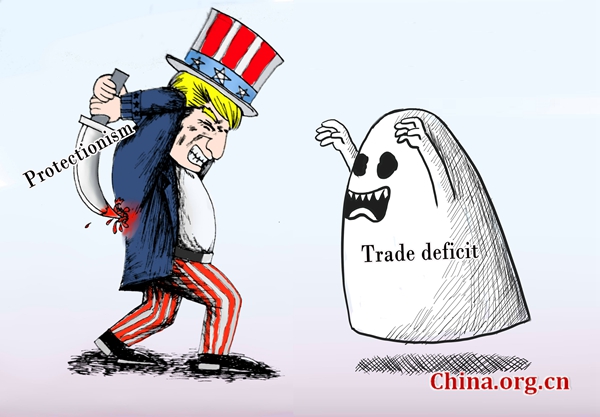Shallow arguments against globalization and China
china.org.cn / chinagate.cn by Elenoire Laudieri Di Biase, April 1, 2017 Adjust font size:
|
|
|
Trade protectionism [By Zhang Xueshi / China.org.cn] |
There are many uncertainties in today's world but one thing leaves no room for doubt: China's rise as a global power. This is a fait accompli which nobody can call into question. However, there are different views as to its implications.
On the one hand, the developing countries of Asia, Africa and Latin America see it as a propitious development in that it creates new opportunities for their economies and helps them finance and carry out important infrastructural projects.
On the other, the developed countries of the West, while profiting from their direct involvement in China's prodigious industrial growth, complain about its adverse impacts on their economies and are increasingly uneasy about globalization.
Indeed, China has benefitted from its vast exports of manufactured products, but their economic repercussions on Western economies have been far outweighed by the consequences of the 2008 global financial crisis, which cannot be attributed to China.
As a matter of fact, before the GFC, globalization did not raise eyebrows in the West as it does today. Moreover, Western analysts fail to consider how the world would be today if China had not embraced the market economy and had remained closed to the outside world.
As far as the United States is concerned, China would not have become their biggest buyers of treasury bills, notes, and bonds, thus allowing the American people to enjoy low consumer prices. Selling debt to China has enabled Washington to inject huge amounts of money into the U.S. economy offsetting the financial mess caused by the GFC. It has also kept U.S. interest rates low.
China accounts for 15 percent of the world economy while contributing 25-30 percent to global growth. This contribution is particularly beneficial to developing countries where China has been channelling substantial investments. If it is true that China's exports have dented the production of consumer goods in developed countries, it is also true that China's imports amount to $10 trillion annually, a great slice of which is made by machinery and upmarket goods produced in the West.
As to China's policies and attitudes on a global scale, some Western analysts hold the view that, as a permanent member of the U.N. Security Council, China avoids taking a stand on international crises or contributing to peace-keeping initiatives in order to maximize its interests through minimal involvement abroad. However, this ignores the fact that in the last ten years, and particularly, since Xi Jinping took over the reins of government, Chinese foreign policy has become far more responsible and engaging than ever before.
President Xi has constantly reiterated during his international tours and face-to-face talks with heads and leaders of foreign countries China's absolute commitment to peaceful international relations and cooperation for the betterment of people's life throughout the world. He has signed an impressive number of cooperation agreements with Asian, African, European and American nations.
The following words pronounced by Wang Yi at a U.N. conference held in New York on September 2013, described in a most clear and resolute way China's foreign policy objectives - disproving any alarmism over China's rise as a global power:
"China will participate in global affairs more actively and comprehensively, closely cooperating with all other countries, handling complex global challenges jointly with others, and solving all kinds of difficult issues facing the human race. We will utter China's voice, contribute China's wisdom, put forward China's proposals, demonstrate China's role, and work hard to provide more public goods for the international community. […]
China will always stress justice when serving its own interests, place justice before its interests, and wholeheartedly provide developing countries with assistance that is within China's capacity in order to facilitate their realization of independent and sustainable development. China will become more active and constructive in participating in and in dealing with international and regional hot issues, in negotiating peace and in ending conflicts, and in safeguarding world's peace and stability."
Elenoire Laudieri Di Biase ( Twitter account: @ElaudierLaudier ), sinologist from the university of Ca' Foscari and Melbourne University, Australia, is an expert on international diplomacy and psychoanalysis. Senior analyst on China at the Nato Defense College Foundation.
Opinion articles reflect the views of their authors only, not necessarily those of China.org.cn.
